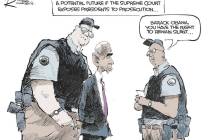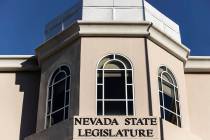Like we’re ever going to pay off this debt
If I invoke the phrase "Greek debt crisis," do your eyelids start to grow heavy?
Do you somehow find it difficult to summon up a fresh wave of outrage if someone mentions that when Barack Obama's National Commission on Fiscal Responsibility and Reform (better known as the Democratic Tax-Hike Justification Front) convened for its second monthly meeting last week, Congress was already 41 days past its April 15 deadline for passing a budget resolution -- scared to death to admit in an election year just how much new debt and spending they intend to crank up?
If these topics fired the American imagination, the most popular prime-time television shows would feature teams of CPAs wiping sweat from their brows as they raced to figure out a tricky tax return on their desktop calculators.
So let's try to avoid a page full of decimals and percent signs. Pardon my ballpark figures.
Go watch the federal debt clock at http://www.usdebtclock.org/. It shows the federal government has promised to pay the folks who bought U.S. bonds $13 trillion which they don't have. Your personal share is about $117,000. Make that $180,000 when all government debt is included.
Total United States unfunded liabilities? I believe that says $108 trillion. With average family income at about $62,000 per year, can you ever pay that off?
Someday soon, people are going to stop loaning money to these Pharoahs of Fakery, these Ptolemies on the Potomac, or else Washington's creditors are going to start demanding some serious collateral for their loans that won't be politically popular. Like, maybe, the Hawaiian Islands.
The Poor Soul tries to envision a solution.
"Gee, Vin. We have to keep paying interest on the debt, and we have to keep meeting our obligations to Social Security, Medicare and Medicaid, since those are moral commitments. Unfortunately, when you add all those up, you get more than half the current federal budget. So if we cut everything else -- the armed forces, farm subsidies, federal courthouses, everything -- by two-thirds, that's a one-third cut in the federal budget. Do that, and stop borrowing -- an end to borrowing is the first step if we really want to start paying down the debt -- and we can at least cut taxes by one-third. That's a good start."
No it isn't. If you stop borrowing, under this keep-on-spending scenario, you have to raise taxes enough to replace the cash flow that was previously covered by your borrowing. Taxes would remain essentially the same, in exchange for which people would get a lot less in government "services." How long would such an austerity regime be tolerated?
Besides, actually paying down the government debt is a terrible idea. Have you ever paid off a credit card? Suddenly your mailbox is full of new credit offers.
If our hypothetical conservative/libertarian austerity administration took over, gutted all those federal "services" people line up for and actually started paying down the debt, how long would it be before the socialists returned to power, only to find they could now borrow even more, because (thanks to our well-intentioned but idiotic efforts) the U.S. of A. would actually now have a better credit rating?
No, if you want to get the U.S. government off the borrow-and-spend treadmill, there's only one answer: default.
You have to win only one election, at which point you declare Social Security, Medicare and Medicaid all bankrupt and closed -- in default. You believed the promises of those lying politicians? Your problem.
You own U.S. bonds? Tough. The politicians lied when they said they had the power to make succeeding generations pay their debts. We're defaulting. You don't get another cent.
Presto. Half of those "mandatory" federal expenditures are gone, overnight. Now slice everything else by two-thirds and you've reduced both federal expenditures and federal taxes by 80 percent.
But here's the best part. Four, six, eight years later the pendulum swings, as it always does, the socialists come back to power. They go back to the folks who used to loan money to Uncle Sam, saying, "Hi, remember us? We're the compassionate progressive collectivist redistributionists, and we're back. We'd like to borrow a few trillion again to re-animate some of these great federal programs that our evil predecessors nailed into coffins and buried out back."
"Loan you money? You just defaulted. Your credit rating is zero."
"No, no, no. That was the evil conservative/libertarians. They're gone now."
"Yeah, and in four years they could be back, and default on your debts all over again. Take a hike."
A massive federal default would prevent the redistributionist thieves from running Washington into debt again, for as much as 50 years.
Start asking the candidates: "Would you vote to default on the federal debt? Why not? The only other solution is to hyperinflate our way out of it, which amounts to the same thing but renders my dollar-denominated savings worthless in the process.
"I don't remember signing anything that said I'd pay all the debts run up by these crooked politicians, while they all retire to a nice ranch. They swore an oath to obey a Constitution that authorizes only a tiny portion of this spending. Isn't a default the only way to end the borrowing and deficit spending for good? Why would that be bad?"
Vin Suprynowicz is assistant editorial page editor of the Review-Journal, and author of "Send in the Waco Killers" and the novel "The Black Arrow." See www.vinsuprynowicz.com/.























